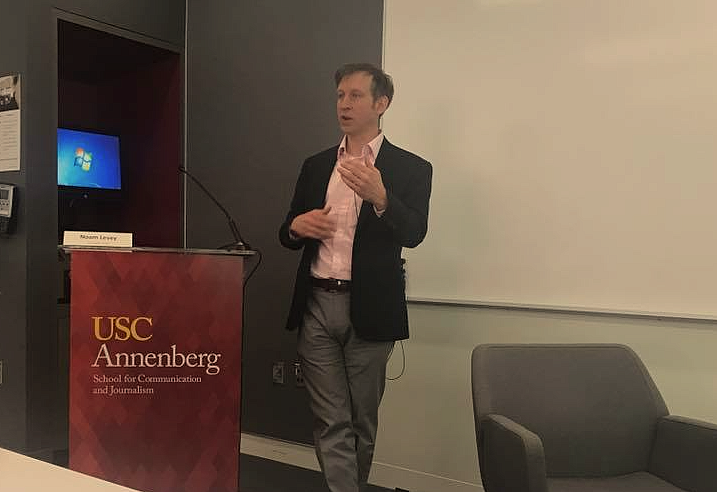LAT’s Noam Levey on how to cover health reform outside Washington right now

Noam Levey, health reporter for the Los Angeles Times, talks to 2017 California Fellows this week.
“It’s nuts in Washington right now,” said Noam Levey last Tuesday, after flying across the country from Washington, D.C., where he reports on health care policy for The Los Angeles Times.
“From the perspective of making policy like health care, those of us who’ve been doing this awhile have never seen anything like this,” Levey told fellows on Tuesday at the USC Center for Health Journalism's 2017 California Fellowship. He was referring not only to the breakneck speed with which Republicans are pushing ahead on the American Health Care Act, but also the unusual lack of an independent score from the Congressional Budget Office on the law’s likely impacts.
“Now we’re in a situation where House Republicans are rushing forward to fulfill a campaign pledge that they made to repeal and replace the Affordable Care Act, not knowing fully what the impact of this law may be,” Levey said. The reason for the rush? “Time is the enemy of health care reform,” said Levey, who also covered the long run-up to the passage of the Affordable Care Act.
So, given the tremendous uncertainty that now envelopes health care reform, what’s a reporter outside the Beltway to do these days? Levey offered reporters a few broad angles of attack.
One storyline Levey thinks local and regional reporters should keep reporting on is how the Affordable Care Act has changed lives in their respective communities.
“It has had very profound, very personal and in some cases life-altering impacts. I don’t think as a general rule that that story has been properly appreciated,” Levey said. “Now that there’s a question about which parts of this law will survive, I think it’s all the more important for reporters who are working away from Washington in local communities to look in their communities about what the law is doing, has done, and what may happen if the law goes away.”
The consequences can be particularly huge for those who gained insurance under the law.
“Having health insurance when you get sick is a big deal,” Levey said. “Those stories continue to be important because, believe it or not, we are in the midst of another debate about whether or not health insurance has an impact on health. I just can’t make the case strongly enough that while we may not think we need to write those stories, those stories are important to write.”
Another storyline Levey urges reporters to explore in greater depth is the extent to which the ACA’s reforms and expansion of coverage have changed the way health care is delivered.
“You have now clinics, hospitals and individual doctors who are making changes in how they deliver medical care because the assumption now is they can care for people now before they end up in the hospital,” Levey said. “That story I think is underreported and extremely, extremely important.”
He pointed to the ongoing shift among many providers to a team-based model of delivery health care.
“If you go into medical offices today, many of them have teams of nurses, pharmacists in some cases, mental health specialists working together to coordinate care for patients rich, poor and otherwise — in part driven by changes that the Affordable Care Act has let loose. And those stories are really, really important, too.”
Such ACA-spurred shifts also include changes in how insurers pay for care. Levey told the story of Dr. Jeffrey Angel, an orthopedic surgeon in rural Arkansas, who has changed the way he replaces knees and hips because of changes in how he is reimbursed for the care of such patients. The surgeon is now rewarded financially for good outcomes, such as keeping a patient from returning to the hospital after surgery.
“He’s paying really close attention to where his patients go to rehab, he’s making sure patients can get in touch with him 24 hours a day, because he doesn't want them calling an ambulance every time they feel something funny in their knee. He wants to be part of their whole care to make sure they feel better and don’t end up back in the hospital.”
Levey urged reporters to report on similar changes in care delivery and incentives among surgeons and primary care doctors in their coverage area. One bankable way to gather story ideas and stay up to date on how healthcare reform is playing out locally is to shadow doctors and nurses in area clinics.
“To the extent that you can get this from your editors, take a half day on a regular basis and go out and spend time with providers,” Levey said. “That experience generates an enormous number of really good stories.”
**

